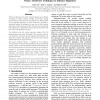Free Online Productivity Tools
i2Speak
i2Symbol
i2OCR
iTex2Img
iWeb2Print
iWeb2Shot
i2Type
iPdf2Split
iPdf2Merge
i2Bopomofo
i2Arabic
i2Style
i2Image
i2PDF
iLatex2Rtf
Sci2ools
MICRO
2008
IEEE
2008
IEEE
Notary: Hardware techniques to enhance signatures
Hardware signatures have been recently proposed as an efficient mechanism to detect conflicts amongst concurrently running transactions in transactional memory systems (e.g., Bulk, LogTMSE, and SigTM). Signatures use fixed hardware to represent an unbounded number of addresses, but may lead to false conflicts (detecting a conflict when none exists). Previous work recommends that signatures be implemented with parallel Bloom filters with two or four hash functions (e.g., H3). Two problems exist with current signature designs. First, H3 implementations use many XOR gates. This increases hardware area and power overheads. Second, signature false positives can result from conflicts with signature bits set by private memory addresses that do not require isolation. This paper develops Notary, a coupling of two signature enhancements to ameliorate these problems. First, we use address entropy analysis to develop Page-Block-XOR (PBX) hashing and show it performs similar to H3 at lower hardwar...
| Added | 31 May 2010 |
| Updated | 31 May 2010 |
| Type | Conference |
| Year | 2008 |
| Where | MICRO |
| Authors | Luke Yen, Stark C. Draper, Mark D. Hill |
Comments (0)

